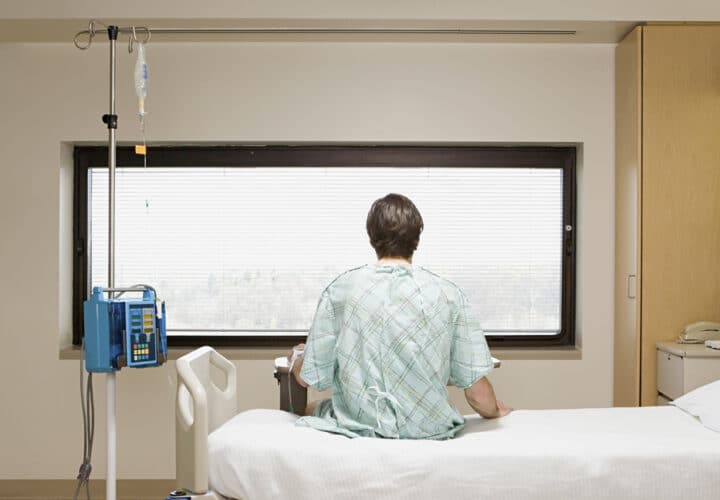Due to “deficiencies” in trial data, the FDA rejected a request to approve the repurposing of Parkinson's drug pimavanserin. The drug would have been the first FDA-approved treatment of dementia-related psychosis. The drugmaker plans to push back.
Acadia Pharmaceuticals said today that it has received a Complete Response Letter (CRL) from the U.S. Food and Drug Administration regarding its supplemental New Drug Application or sNDA for pimavanserin — currently sold under the brand name Nuplazid and approved for treatment of Parkinson’s-related psychosis — for the treatment of psychosis associated with dementia.
The drug had been under consideration for the treatment of dementia-related psychosis symptoms including hallucinations and delusions. As of July 2020, an FDA decision was expected by April 3, 2021.
While there were no safety concerns noted in the agency’s CRL, the FDA “identified deficiencies” in the trial data, according to Acadia, and cited a lack of statistically significant results in some dementia subgroups, as well as insufficient trial size to support approval. The CRL also stated that the FDA’s Division of Psychiatry found that the drug’s Phase II trial “to not be adequate and well controlled.”
The company maintains that the study support’s the drug’s efficacy.
“Acadia stands behind the robustly positive results from the pivotal Phase III HARMONY study and the prospectively agreed trial design and criteria for establishing efficacy in DRP. Over the entire course of the review, the Division did not raise any concerns regarding the agreed upon study design, including the issues raised in the CRL,” Acadia CEO Steve Davis said. “We will immediately request a Type A meeting to work with the FDA to address the CRL and determine an expeditious path forward for the approval of pimavanserin in DRP.”
In trials, Acadia previously reported that pimavanserin had appeared to yield “a robust reduction” in the severity of psychosis symptoms during a 12-week, open-label phase of a large-scale, international phase III relapse-prevention trial. Researchers from University of Exeter, in collaboration with Acadia, reported that the drug “substantially reduced” psychotic symptoms as well as reducing risk of relapse of those symptoms, compared to placebo in people with dementia.
In December 2019, Senior Director of Clinical Research at ACADIA Dr. Erin Foff said of the trial: “The take-home here is that pimavanserin significantly reduced the risk of relapse by almost three fold,” she said. Further, according to Foff, more than twice the number the patients who received a placebo during the trial had a relapse into psychosis, compared to those who received the drug.
High Stakes, High Hopes for Pimavanserin Approval
As many as half of the 45 million people worldwide who are living with Alzheimer’s will experience psychotic episodes, and that number is even higher among people living with some other forms of dementia. Psychosis is linked to a faster deterioration in dementia. But to date, there is no approved, safe, effective treatment for symptoms linked to dementia-related psychosis.
Antipsychotics, while widely used (and alarmingly, widely misused), can lead to sedation, cause falls, and may double the speed at which brain function deteriorates. They have been linked to higher rates of hospitalization among people living with dementia, and when it comes to ICU delirium, they have been found to be ineffective. Patients, doctors and caregivers have long sought safer alternatives.
In contrast to anti-psychotics — the side-effect-laden current go-to for these symptoms — pimavanserin is said to work by blocking a specific nerve receptor (5HT2A) in the brain. Researchers report that this “can effectively reduce symptoms of psychosis in people with Alzheimer’s and other dementias, without evidence of some of the common side effects observed with other antipsychotics.”
According to the Director of Banner Alzheimer’s Institute Dr. Pierre Tariot, who was a paid consultant with Acadia in the research of pimavanserin, there is a huge unmet need for an effective treatment of the hallucinations and delusions of dementia: As many as half of people with dementia experience psychotic episodes.
“At some point in the course of somebody’s dementia, there’s virtually 100 percent probability that they will experience significant and distressing neuropsychiatric signs and symptoms, so in other words, [there is a] 100 percent lifetime risk in the course of the illness.” Tariot told Being Patient. “And among those, psychotic features — that is to say delusions and/or hallucinations — loom large [in over] 40 to 50 percent or so of those folks.”
What’s Next for Acadia’s Dementia-Related Psychosis Drug Candidate?
The rejection hasn’t come as a complete surprise: Last month, Acadia revealed the FDA was unwilling to discuss marketing requirements due to issues with the application. According to Biospace.com, this is evidence to support speculation that the FDA may be getting tougher on drug approvals.
According to nasdaq.com, as of Monday morning, the company’s stock had dropped just over 14 percent following the news. Acadia appears to plan to push for reconsideration and work with the agency to develop an “expeditious path forward” toward approval.



